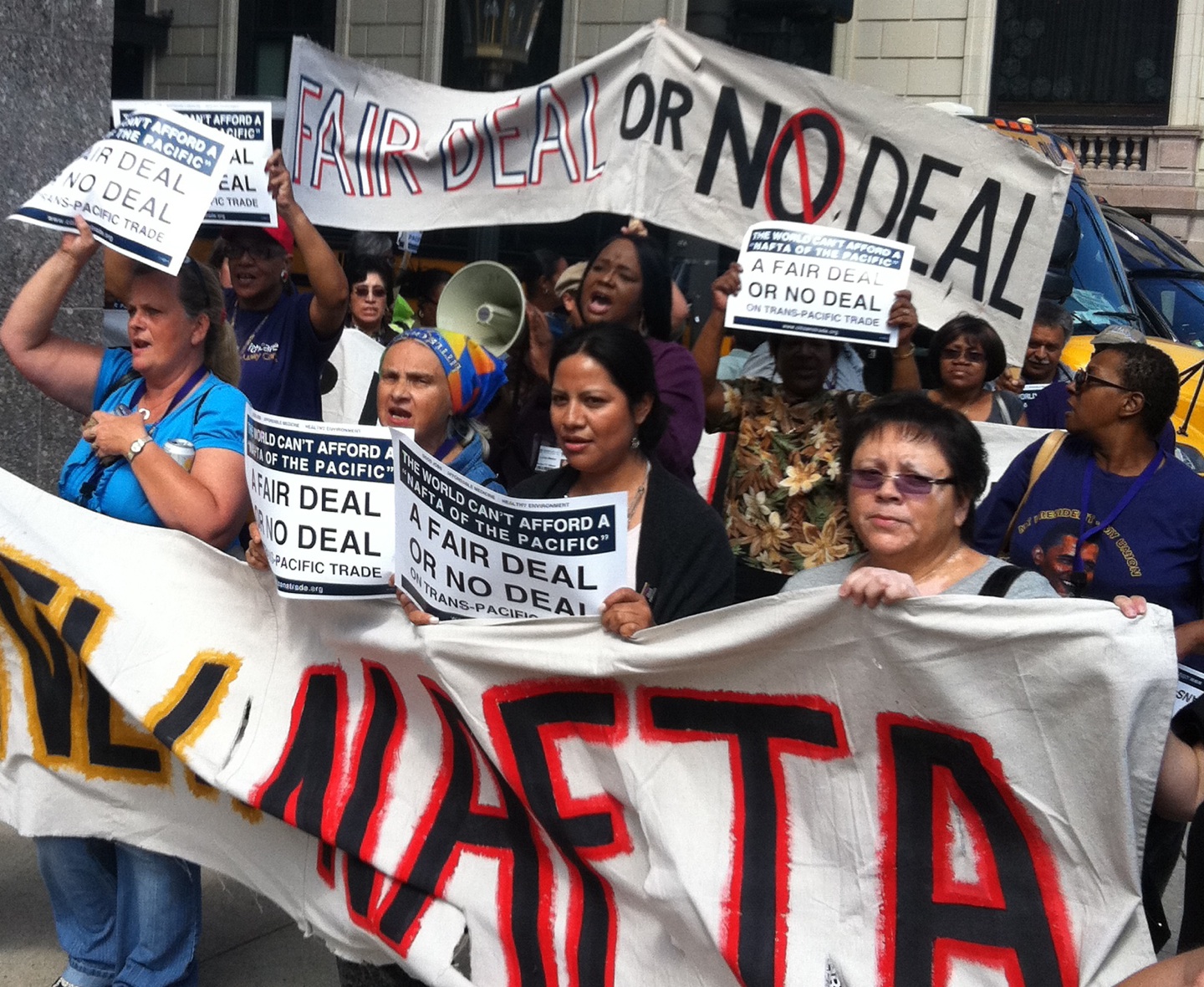 The Trump administration just published proposed text for its renegotiated version of the North American Free Trade Agreement (NAFTA), and they've failed to make the critical changes needed to protect jobs, raise wages, defend human rights and reverse environmental damage.
The Trump administration just published proposed text for its renegotiated version of the North American Free Trade Agreement (NAFTA), and they've failed to make the critical changes needed to protect jobs, raise wages, defend human rights and reverse environmental damage. As much as the White House wants to spin the current deal as a win, a lot more work is needed before there’s a real NAFTA replacement that working families can be happy about.
TAKE ACTION: Please urge your Members of Congress to insist on a comprehensive NAFTA replacement that puts working people and the planet ahead of corporate profits.
Each week, NAFTA continues to destroy livelihoods across the continent. Unfortunately, the deal currently on offer does not include the enforcement mechanisms needed for labor and environmental standards to prevent employers from moving jobs to areas where worker rights and environmental protection are routinely ignored.
Without strong labor and environmental rules with swift and certain enforcement, Trump’s version of NAFTA will continue to facilitate the outsourcing of jobs, the suppression of wages and the dumping of toxins. While steps forward have been made in other areas, a NAFTA replacement without this fundamental fix is a nonstarter.
In addition, Trump’s proposal is significantly worse than the original NAFTA on access to medicines. The world needs trade policies that increase the affordability of life-saving medications — not ones that extend monopolies for pharmaceutical giants and raise healthcare costs.
Beyond failing to even mention climate change, the current proposal also seeks to maintain special rights for some of the planet's most egregious corporate polluters. If allowed to move forward as written, these handouts to oil and gas companies would prolong NAFTA’s ongoing threats to our air, water and climate.
As written, the current proposal simply does not deserve support in Congress or anywhere else. All parties involved should continue working towards a trilateral agreement that actually benefits working people and the planet.
ACT NOW: Please tell Congress that the current NAFTA proposal is unacceptable and that important additional changes are needed to ensure it benefits your community and those throughout North America.
Together, we can make a difference.
Many thanks,
Arthur Stamoulis, Executive Director
CITIZENS TRADE CAMPAIGN
UNIONS WARY OF NEW NAFTA: Unions that spent years criticizing NAFTA's inadequate labor protections were far from elated about the Trump administration's new deal. Instead, five major union leaders who met with President Donald Trump in August to discuss NAFTA offered tepid acknowledgment of new provisions and warned that the Trump administration "could easily fail to enforce labor protections in the new agreement," reports POLITICO's Ian Kullgren.
AFL-CIO President Richard Trumka, United Steelworkers President Leo Gerard, Teamsters President James P. Hoffa, International Association of Machinists President Robert Martinez and United Automobile Workers President Gary Jones cautioned that the so-called U.S.-Mexico-Canada-Agreement might not amount to a significant improvement for American workers, reflecting a deep distrust among unions that a Republican administration will remain a steadfast ally on trade.
But the lukewarm response isn't all bad. "A decision by labor leaders not to oppose the agreement, even if they don't actively support it, could lower political opposition in Congress," Jacob Schlesinger writes in The Wall Street Journal. He adds that "while crafting the new NAFTA in a way to try to draw labor support, the Trump administration has also written a deal highly appealing to many business groups, especially in the provisions aimed at 'modernizing' the pact that hasn't been amended since it took effect in 1994."
And labor unions are actually some of the deal's biggest winners, according to The Washington Post's Heather Long, because of requirements that "30 percent of cars (rising to 40 percent by 2023) must be made by workers earning $16 an hour," and that Mexico must make it easier for workers to unionize.
If Democrats win any majority in the House, the new agreement "will face an uphill battle to becoming law," writes POLITICO's Megan Cassella. Some Democrats have expressed concerns about the labor standards that will make it into the final deal, such as Sen. Sherrod Brown (D-Ohio), who has "long warned that the current deal is falling short on labor issues," she writes. "But if the new agreement marks a significant step forward on areas like workers' rights and wages — regardless of whether it goes as far as he and others might like — they might vote in favor of the deal in order to show support for the fact that the new standards were included at all."
No comments:
Post a Comment